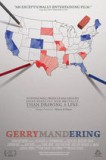| Reviews & Columns |
|
Reviews DVD TV on DVD Blu-ray 4K UHD International DVDs In Theaters Reviews by Studio Video Games Features Collector Series DVDs Easter Egg Database Interviews DVD Talk Radio Feature Articles Columns Anime Talk DVD Savant Horror DVDs The M.O.D. Squad Art House HD Talk Silent DVD
|
DVD Talk Forum |
|
|
| Resources |
|
DVD Price Search Customer Service #'s RCE Info Links |
|
Columns
|
|
|
Gerrymandering

Reviewed at the 2010 Tribeca Film Festival
Definitions first: "Gerrymandering" is the process of re-drawing the districts for state and federal legislatures. In the House of Representatives, for example, the census might determine that particular body's seats have to be redistributed because of population shifts; gerrymandering is the re-drawing of those lines. But it's done at a state and local level too, and because the United States is basically the only civilized government that lets the politicians themselves re-draw the lines, well, they're often re-drawn to the advantage of that politician and/or their party. It's a crooked, dirty process, and early in Jeff Reichert's documentary Gerrymandering, we see clips of presidents from JFK to Obama decrying the process. But it's not stopped, because it's in the best political interests of whoever is in enough of a majority to stop it--and, in many cases, it's a quick and easy way to rig the process in your favor. Or, as one commentator puts it, "Why stuff ballot boxes when you can draw districts?"
Reichert's film uses, as its framework, the 2008 California ballot measure "Prop 11," designed to remove politicians from the process and allow re-districting to be done by an independent panel. The movement is backed by Governor Schwarzenegger, who appears at rallies and comes to the offices of California Common Cause; while there, he sees the documentary crew and ends up giving them structural advice for their film (they should come to the election night party so the picture has "a beginning, a middle, and an end... then it will be like a real movie.")
As Reichert tracks that initiative, we get a history of the process (there's a terrific explainer with sharp, helpful graphics) and examples of how it affects, and in some instances negates, the democratic process. Some of the stories are small but stunning, like that of Hakeem Jeffries, the New York State Assemblyman who, after an unsuccessful but closer-than-expected pervious run for the office, saw the 20-year incumbent redraw the district right around Jeffries' block. There are examples of prison-based gerrymandering, where the prison population is used to pad districts (even though those prisoners can't vote); "the ideal district," an observer notes, "would be a prison and your house." And then there are the racial politics--as the film explains, Barack Obama may very well have lost his first bid for public office because of gerrymandering, and won his subsequent Senate seat partially because of it.
One of the film's centerpiece sequences is centered on the Texas state legislature; there was a big hullabaloo in 2003, when fifty-some Texas Democrats fled across the state line to an Oklahoma Holiday Inn (Jon Stewart is seen having a great time at the lawmakers' expense). Much hay was made of the state legislators fleeing their responsibilities, but we finally get some context here--Tom Delay had coordinated an out-of-nowhere re-drawing of the lines to pick up extra Republican seats, and the Democrats were attempting to push the vote past a deadline. Delay won; that November, Republicans picked up six more Republican seats.
The more you hear about the process, the more steamed up you get--though the film is far from an angry political screed. It's snappily paced, smartly assembled, and frequently funny, while commentary (from political figures like Howard Dean, Ed Rollins, Governor Schwarzenegger, and his predecessors Pete Wilson and Gray Davis) is pointed and valuable. The film only steps wrong in its closing moments. While Reichert is clearly against the process, he's gone to the trouble of resisting comment throughout the film, even giving voice to the opponents of Proposition 11 and their asinine arguments. But then, at the end, we get big, bold, explicit on-screen titles instructing us to "END GERRYMANDERING." It's a little bit insulting--look, we've come to see a film called Gerrymandering, for God's sake, so maybe you don't have to spell out the message to us like we're a bunch of mouth-breathers. We just watched the movie. We get it. Message delivered.
Jason lives in New York. He holds an MA in Cultural Reporting and Criticism from NYU.
|
| Popular Reviews |
| Sponsored Links |
|
|
| Sponsored Links |
|
|
| Release List | Reviews | Shop | Newsletter | Forum | DVD Giveaways | Blu-Ray | Advertise |
|
Copyright 2024 DVDTalk.com All Rights Reserved. Legal Info, Privacy Policy, Terms of Use,
Manage Preferences,
Your Privacy Choices | |||||||











